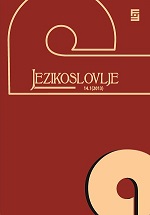Semantic network of the Basse Mandinka BANTA form
Semantic network of the Basse Mandinka BANTA form
Author(s): Alexander AndrasonSubject(s): Language and Literature Studies
Published by: Filozofski fakultet, Sveučilište Josipa Jurja Strossmayera, Osijek
Keywords: Basse Mandinka; construction; resultative; evidential; grammaticalization
Summary/Abstract: The present study – developed within the cognitive framework – provides a description and explanation of the semantic potential offered by the Basse Mandinka BANTA construction (i.e. a verbal gram formed by the auxiliary banta – originally the verb baŋ ‘be finished’, employed in the TA tense – and the stem of a meaning verb). The evidence demonstrates that the locution dis-plays a wide range of uses that employ two semantic domains. One includes taxis-aspectual-temporal values, such as resultative proper, present perfect, perfective past, simple past, pluperfect, resultative-stative present and past, stative present and past, simple present and imperfective past. The other con-sists of modal nuances: evidential, inferential and epistemic. In all concrete instances, the BANTA form combines one semantic component of the former group with one element of the latter class. Furthermore, the author shows that all these senses may be networked and chained by employing certain typologically plausible evolutionary scenarios, typical of resultative formations – such as the BANTA form itself. Under this viewpoint, the gram’s meaning (i.e. its entire polysemy) is represented as a grid of connected values. This connection, both diachronic and conceptual, is granted by the correspondence between the values offered by the BANTA locution and stages of three developmental processes. Namely, non-modal values correspond to stages on the resultative path, either on the anterior or simultaneous sub-cline, while modal senses mirror the evidential track.
Journal: Jezikoslovlje
- Issue Year: XIV/2013
- Issue No: 1
- Page Range: 1-31
- Page Count: 31
- Language: English

